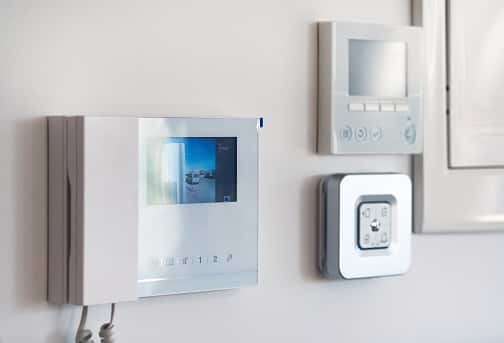How to deter burglars
Practical ways to protect your property

Burglars like easy marks and quick escapes. Anything quick to sell — jewelry, electronics, guns, cash — could be attractive. They often target older people, who tend to have more valuables and medications.
According to a study by The University of North Carolina at Charlotte’s Department of Criminal Justice and Criminology, burglars are usually motivated by drug addiction or the need for living expenses. These crooks tend to gain entry to homes through unlocked doors or by forcing windows open. Burglaries can happen at any time — day or night — but most burglars prefer to commit crimes in the early morning or late in the evening.
Key insights
- One effective way to prevent break-ins is to install an alarm system and camera or video doorbell.
- It’s a good idea to invest in high-quality deadbolts and window locks — these make it harder for a thief to enter.
- Another smart move for keeping burglars away is to make it look like someone’s always home.
Securing your home’s exterior
Take a walk around the outside of your house as if you were intending to break in: What’s visible? What’s tempting? What would make you think your home is well protected — or not?
Burglars often target weak points (e.g., doors, windows) in a home's security. When it comes to fences, avoid solid wood fences, which can act as cover. Get a chain-link fence with the bottom secured so it can’t be lifted, or install barbed wire to deter potential thieves.
It’s also a good idea to avoid leaving spare keys outside where unwanted guests can find them. Instead, give a spare to a trusted neighbor or friend.
» COMPARE: Best outdoor security cameras
Safety starts at the front door
“First things first, you should take stock of any area of your home that could be a potential breach point for intruders. Add locks on windows, doors and any other relevant entry points,” Tim Reneimo, co-founder of Security Guards Only, said.
Screwdrivers are the most common tool burglars carry, followed by crowbars and hammers, according to the UNC Charlotte burglary study. Make sure the screws on your door hinges aren’t on the outside.
In 2019, 55.7% of break-ins involved forcible entry, according to the FBI.
“To really deter burglars, I recommend looking into some kind of video doorbell with an auto-locking system,” Reneimo said. “A video doorbell/lock acts as an intrusion barrier because potential thieves will recognize that the homeowner can tune in and see them, wherever they are at that time.”
More tips for securing doors and fortifying entry points include:
- Installing a manual stopper or door brace
- Using a strike plate
- Upgrading your door material
- Installing burglar bars
- Securing sliding doors with locks or bars
- Putting security film on windows
Landscaping, lighting and other considerations
Burglars avoid well-lit areas, so installing motion sensor lights outside your home can be an effective deterrent. Keeping a well-maintained garden and lawn is another excellent way to deter robberies. For example, thorny plants or bushes around windows and doors can make your home more difficult to infiltrate.
Joshua Rogala, a criminal defense lawyer with a lot of experience with breaking-and-entering cases, said, “Leaving expensive items unsecured in your backyard is a sure way to attract the attention of a would-be thief.”
Don Chambers, a real estate investor with more than 70 properties, can attest to this: “I went to great lengths to protect an air conditioner. I had a custom-built cage made that perfectly fit the air conditioner. I bolted it to a concrete slab and ground off the bolt head so it couldn't be removed.”
But somebody still stole the entire AC unit, plus the cage: “They snatched it off the slab with a truck to get the $50 worth of copper inside the unit.”
His solution?
"I installed a motion-activated pepper spray device in the crawlspace, he said. "The thieves never returned, but it got me once when I forgot to disarm it.”
» MORE: Best DIY home security systems
Securing your home’s interior
Around 60% of burglars surveyed for the University of North Carolina study said the presence of an alarm would make them seek an alternate target.
Smart home security systems can be remotely controlled and monitored using an app, making it easy to keep an eye on your home even when you're away. Some even use facial recognition technology to alert you when an unknown person enters your property.
Unfortunately, as technology advances, burglars are also becoming more savvy. It doesn’t happen often, but more sophisticated thieves can hack your security system and exploit vulnerabilities in other electronic devices.
According to Zack Albrecht, the co-founder of Home Security Strategy, here are the top five tips to prevent burglars from bypassing your security system:
- Use strong passwords: Make sure your home Wi-Fi network is secure with strong passwords and encryption.
- Keep software up to date: Ensure that all software, including security software and device firmware, is updated with the latest security patches.
- Use two-factor authentication: Enable two-factor authentication on all devices and accounts that support it.
- Use a separate Wi-Fi network: A different network for smart home devices helps isolate potential security breaches and prevents hackers from gaining access to your main network.
- Be careful with third-party apps: If you use a third-party app to control your home security system, it should come from a trusted source.
» COMPARE: Best smart home security systems
Make it look like you’re home — even when you’re not
Since it’s riskier to burglarize a property with people nearby, homes that are unoccupied for stretches of time often become targets.
For instance, a pile of newspapers, trash cans in the driveway and an overgrown lawn make it look like the house could be unoccupied and signal a low-risk opportunity for burglars.
Remember, the key is to make your home look lived in, even when it's not. Use a combination of these tips to create the impression that someone is home:
- Hold or stop your mail at the post office while you’re gone.
- Put your lights on a timer.
- Leave the TV or radio on at a low volume.
- Hire a lawn service to keep your yard looking maintained.
- Consider hiring a trustworthy housesitter.
Unleash the power of protection

“Despite all the new technology, the absolute best way to deter a burglar is with a guard dog,” said Jason Hitchcock, founder of Survival Stoic, a blog dedicated to preparing for disasters.
Dogs have excellent hearing and a sense of smell, making them highly attuned to potential threats. They tend to let you know about any unusual activity around your house.
Despite all the new technology, the absolute best way to deter a burglar is with a guard dog.”
“Once a burglar sees or hears a dog, they immediately have to go on the defensive," Hitchcock said. "It disrupts their entire plan, and if they’re in the same area as the dog, it immediately causes fear, and they are forced to run. No other system or gadget can have this same effect."
Frequently asked questions
What should I do if my house is broken into?
If your house is broken into, take the following steps:
- Stay outside: If you come home and suspect a break-in, don’t go inside; the intruder could still be in your house.
- Call the police: Contact the police immediately and provide them with as much information as possible, including what you suspect has been stolen.
- Make a list of stolen items: Write down what you suspect has been stolen, and take photos if possible. This information will be helpful for insurance purposes.
- Call your insurance company: Contact your insurance agent as soon as possible to report the burglary and provide them with a copy of the police report. Most renters insurance and home insurance policies cover losses from theft.
- Prevent future break-ins: Consider installing a security system or making other improvements to your home security to reduce the risk of future burglaries.
What time do burglars typically break in?
According to FBI data on break-ins in 2021, about 55% of residential burglaries that year occurred during the day, while about 43% occurred at night (about 2% did not have time-specific data).
» EXPLORE: Safest states in America
How much is a home security system?
How much you pay for a security system depends on your equipment and monitoring preferences. Equipment costs start around $200 on the low end, but plenty of packages cost $1,000 or more.
The ConsumerAffairs Research Team conducted a home security cost analysis that showed the average price for professional monitoring services is approximately $35 per month. However, costs vary between $15 and $70, depending on the alarm company.
» COMPARE: The cheapest home security systems
Bottom line
Visible signals that a house is being monitored or under surveillance and signs with messages warning about dogs and weapons appear to be the best way to deter a burglar. Maintaining a clean, well-lit yard, reinforcing entry points and installing an alarm system are other smart ways to secure your home from burglars.
While having a security system can be a deterrent to burglars, it’s not always 100% effective and can sometimes create a false sense of security. You should take additional measures, such as securing doors and windows, installing motion sensor lights and getting to know your neighbors.
» FIND: Best home security cameras
Article sources
- FBI, “ Burglary .” Accessed May 4, 2023.
- The University of North Carolina at Charlotte Department of Criminal Justice and Criminology, “ Understanding Decisions to Burglarize From the Offender’s Perspective .” Accessed May 4, 2023.
- FBI, “ Crime Data Explorer .” Accessed May 8, 2023.
You’re signed up
We’ll start sending you the news you need delivered straight to you. We value your privacy. Unsubscribe easily.
